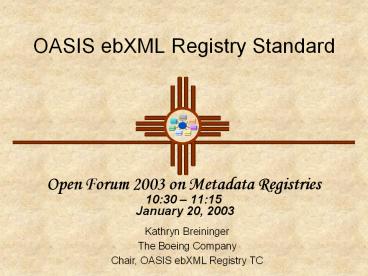OASIS ebXML Registry Standard - PowerPoint PPT Presentation
Title:
OASIS ebXML Registry Standard
Description:
Query schemas based on binding to Registry Information Model ... Inter-registry cooperation ... New Features in Version 3.0. Cooperating registries. Event notification ... – PowerPoint PPT presentation
Number of Views:31
Avg rating:3.0/5.0
Title: OASIS ebXML Registry Standard
1
OASIS ebXML Registry Standard
- Open Forum 2003 on Metadata Registries
- 1030 1115
- January 20, 2003
Kathryn Breininger The Boeing Company Chair,
OASIS ebXML Registry TC
2
What is an ebXML Registry?
- Provides services for sharing information
- Provides publishing and discovery of information
- Accessible as a web service
- Communicates using XML based request and
responses - Provides mechanisms to store and retrieve
persistent information - Includes a Repository
3
Why We Need Registries
- To enable publishing and discovery of information
objects and artifacts - Technical specifications
- Business documents
- Multi-media content
- Core components, schemas, XML DTDs, UML models,
and other artifacts needed for electronic
business - Allows organizations to locate business process
information - Trading partners
- Business processes
- Services and capabilities
- Business objects and artifacts
4
Architectural Principles
- Distributed Object-Oriented information model
- Extensible information model
- Dynamic metadata support
- Service interfaces carry XML structures
- Security designed in not an after thought
- Native language (I18N) support
- Web Service interface to registry supports
multiple interface options - SOAP 1.1 with attachments
- ebXML Messaging Service
- Pure HTTP
5
ebXML Registry Architecture
6
OASIS ebXML RegistryKey Features
- Registry plus Repository
- Registration of any type of object
- Classification of any type of object
- Taxonomy hosting, browsing and validation
- Association between any two objects
- Registry packages to group any objects
- Links to external content
7
Registry Client Interfaces
8
Registry Information Model
9
Object Oriented Architecture
10
Object Classification
- Arbitrary schemes
- Multiple classifications
- Hierarchical semantics
- Contextual classifications
11
OASIS ebXML RegistryKey Functions
- Life cycle management of objects
- Flexible query options
- Security functions
- Inter-registry cooperation
- Event archiving complete audit trail
- Service registration and discovery
12
Lifecycle Management Service
- Submission of repository items, their registry
entries and dynamic metadata - Single request allows batch submission
- Schemes, Classifications, Associations etc. all
submitted the same way - Approval of submitted content
- Deprecation of submitted content
- Deletion of submitted content
13
Lifecycle of a Registry Object
14
Query Service
- Multiple query options
- XML based filter queries
- SQL queries (optional)
- W3C XQuery queries
- Query schemas based on binding to Registry
Information Model - Support for retrieval of registry entries and
repository items
15
Security Functions
- Access control policy
- Permissions
- Privileges
- Roles
- Groups
- Identity
- Principal
16
Inter-registry cooperation
- Allows multiple ebXML Registries to work together
to address user needs - Access to ebXML registry objects and repository
items over HTTP
17
Event Archiving
- Selected events trigger an audit trail
- Provides long-term record of events for changes
- Reflects a change in life cycle of registry
object (create, update, deprecate, delete) - Read only access is not part of the audit trail
- Each event identifies the user requesting the
change that generated the audit trail
18
Publish and Discovery of Web Services
- Services, service bindings, and specification
links are Registry Objects - Service definition is stored in Repository
- WSDL, ebXML CPP/BP, CORBA IDL
19
New Features in Version 3.0
- Cooperating registries
- Event notification
- Content management services
- HTTP interface to registry
- Iterative query support
20
Cooperating Registries
- Enables multiple ebXML Registries to work
together to address user needs - Based on a loosely-coupled federation model
- Allows local autonomy to each registry operator
- Enables smaller registries to access resources of
larger registries - Enables federated queries to multiple registries
- Inter-registry object references
- A registry may belong to multiple Federations
21
Event Notification
- Enables notification of events regarding registry
objects - Clients may be registry users or other registries
- Leverages existing Registry Services interfaces
- Subscription Service registers clients for
notification - Supports e-mail notification and programmatic
- Flexible notification options
- References to event
- Actual event
- Objects affected by the event
22
Content Management Services
- Enables content management based on object type
- Content cataloging and validation
- Validate on submission
- Cataloging metadata applied on submission
- Content-based publish, discovery and subscribe
- User-defined relationships between content
- Associations of internal and external
classification - Invocation control file defines rules for
cataloging service
23
Cataloging Invocation Model
24
HTTP Interface to Registry
- Provides a pure HTTP interface to Registry
- Does not require SOAP
- Registry objects and Repository items addressable
via URLs - Allows ebXML Registries to interoperate with
other types of registries - Improves access to Registry content
25
Iterative Query Support
100 results returned in each iteration from 1007
total result set
26
ebXML Standards Development
- A result of a global, open initiative sponsored
by UN/CEFACT and OASIS - Built upon past standards efforts, such as ISO
11179 - Based upon a flexible architecture
- Provide a comprehensive registry platform
- Have widespread support, momentum and adoption
- Version 3.0 enhancements provide improved
functionality for business needs
27
Additional Information
- OASIS ebXML Registry Technical Committee
- http//oasis-open.org/committees/regrep/
- ebXML.org
- http//www.ebxml.org/
- Version 2.0 Implementations
- Open Source Implementation
- http//sourceforge.net/projects/ebxmlrr
- ebxmlsoft Inc. Implementation
- http//www.ebxmlsoft.com/
- XMLGlobal Implementation
- http//www.xmlglobal.com/prod/registry/index.jsp
28
Questions?
29
For More Information
- Kathryn Breininger
- Chair, OASIS ebXML Registry/Repository TC
- kathryn.r.breininger_at_boeing.com

